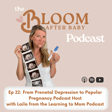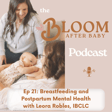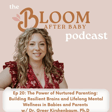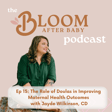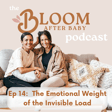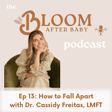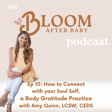
Debunking Pop Wellness Trends: Nervous System Regulation, Elevated Cortisol And Bogus Supplements
It has to be said though. It’s getting out of hand! Moms who are in thralls of postpartum and the chaos of overwhelm are scrolling searching for real advice… social media has been such a valuable way for more experts to reach more people, but there are a lot of others misusing it and looking to sell *garbage*
In this episode of the Bloom After Baby podcast, Jen delves into the misconceptions surrounding nervous system regulation and its correlation with stress and anxiety. She addresses the misleading information prevalent in the wellness industry and emphasizes the importance of understanding the root causes of stress rather than relying on quick fixes. Join Jen as she navigates through the complexities of nervous system dysregulation and offers insights on holistic approaches to managing stress and anxiety.
A few of my favorite resources for learning about reducing anxiety, learning how to recognize signs of stress and anxiety in your body and environment, and tools for building resilience:
1. The Anatomy of Anxiety by @ellenvoramd
2. Real Self-Care by @poojalakshmin
3. Nurtured Revolution by @nurture_neuroscience_parenting (and her interview on @bloomafterbaby pod Ep 20)
4. Rattled by @drnikkipensak (coming on the pod very soon!!!)
Sponsors:
Needed | Get 20% off your first purchase. Just use the code Bloomafterbaby at checkout
Follow along with Bloom After Baby for all things maternal mental health: Instagram @bloomafterbaby [https://www.instagram.com/bloomafterbaby/?hl=en] and website bloomafterbaby.com [https://www.bloomafterbaby.com/]
** Don't forget to leave a rating and review if you enjoy this Podcast! Thank you so much! 🥰 **
This podcast does not contain medical advice and is for entertainment purposes only.
------------------------------------------------
nervous system regulation; stress and anxiety; misconceptions; elevated cortisol; holistic approaches; root causes of stress; postpartum; overwhelm; how to regulate your nervous system; how to lower your cortisol





